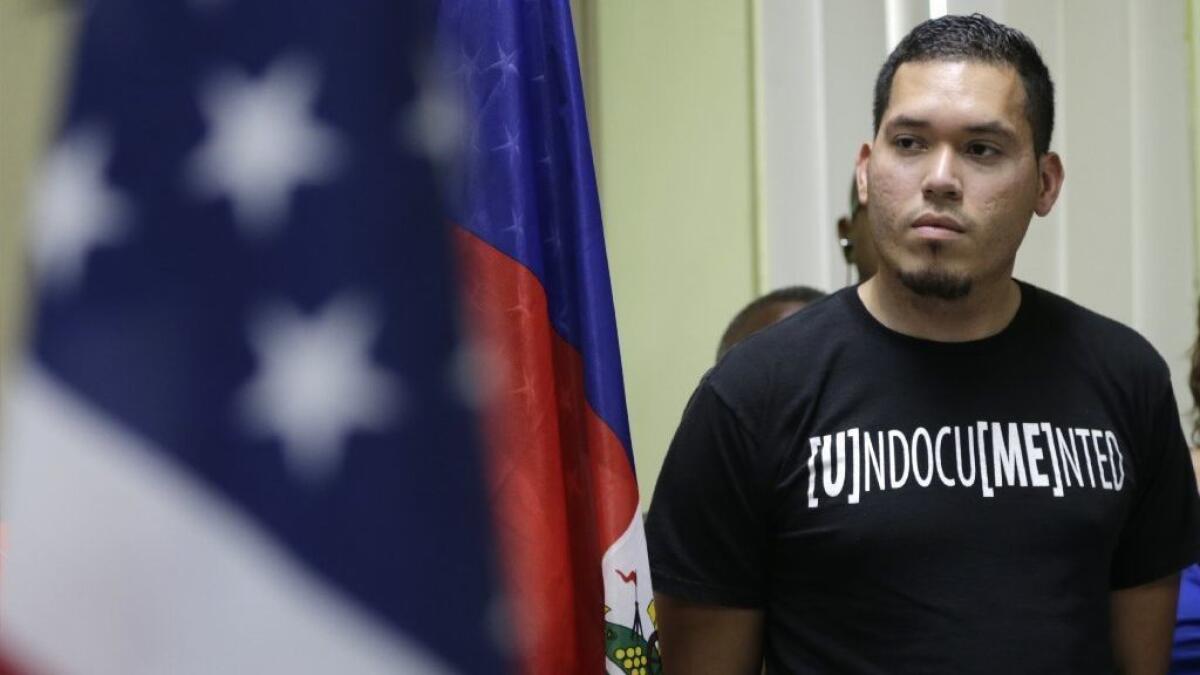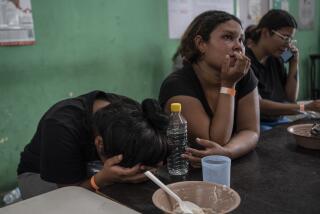Trump administration ending temporary status for Hondurans, the latest immigrant group to have protections revoked

Reporting from Washington — The Trump administration says it will strip legal protections for 86,000 Hondurans who live in the U.S., the latest group of longtime undocumented residents who now face the prospect of deportation back to their troubled home countries.
Kirstjen Nielsen, the Homeland Security secretary, on Friday announced the end of temporary protected status for Honduras, saying that conditions there have vastly improved and that the Central American nation can safely accommodate its returning citizens. The status, which had been set to expire July 5, will be extended until January 2020 to give Hondurans time to prepare.
Temporary status was created by Congress to provide a haven for people living illegally in the U.S. whose home countries suffered wars or natural disasters. The protections were extended to Hondurans in January 1999, two months after Hurricane Mitch swept through the country, killing 7,000 people and leaving 1.4 million others homeless.
Past administrations repeatedly extended the program for countries like Honduras that continue to struggle with extreme violence and chronic political instability. In the most recent extension, in 2016, the U.S. said Honduras was still suffering lingering effects from Mitch and other disasters.
But the Trump administration has been far more strict, insisting that the program shouldn’t be a permanent pass to stay in the U.S. The administration has also ended protections for El Salvador, Haiti, Nicaragua, Sudan and Nepal. The program was extended for South Sudan, still riven by a civil war.
All told, the administration has ordered more than 300,000 people from those countries to return to their homelands over the next two and a half years.
Administration officials have said they would work with Congress to pass laws to legalize the status of longtime U.S. residents who have put down roots and raised families. Immigrant advocates say, however, that the administration has made no push to move bills that are now languishing in Congress.
In explaining the latest decision, Department of Homeland Security officials released a statement saying: “Based on careful consideration of available information, including recommendations received as part of an inter-agency consultation process, the secretary determined that the disruption of living conditions in Honduras from Hurricane Mitch that served as the basis for its TPS designation has decreased to a degree that it should no longer be regarded as substantial.”
Coverage of national politics »
Government officials in Honduras, immigration advocates in the U.S. and Democratic members of Congress had lobbied the administration to make an exception for the troubled Central American nation, which has one of the highest homicide rates in the world, high rates of violence against women and widespread corruption. The country’s problems have only intensified since a recent presidential election widely viewed as fraudulent.
“Honduras is already one of the most violent countries in the world,” said Vicki Gass, senior policy advisor for Oxfam, a global advocacy group. “It is inhumane and unconscionable to forcibly deport them to an unsafe country and may put their lives in jeopardy.”
Advocates say ending the protections now will be devastating for people who have been building lives in the U.S. for two decades. Hondurans covered by temporary status have an estimated 53,500 children born here. Many work in construction and in child care, with high concentrations living near Houston, New York and Los Angeles.
Jeanne Atkinson, executive director of the Catholic Legal Immigration Network, was one of six advocates who met with Nielsen on Wednesday, arguing that conditions in Honduras were too dangerous to think of ending the program. She said the Trump administration’s strict reading of the TPS statutes is part of its overall crackdown on immigrants and refugees.
“What we’re seeing is a dismantling of protections under immigration law,” she said. “We’re hearing children being called ‘loopholes.’”
Unlike other countries which have lost TPS status, the government of Honduras enjoys good relations with the Trump administration. Honduras and Guatemala were among a small handful of countries that voted with the U.S. against a United Nations resolution condemning Trump’s decision to recognize Jerusalem as the capital of Israel.
Some Honduran officials had hoped those votes would curry favor with Trump and help win another renewal of the temporary protections.
Honduran deputy foreign minister Jose Isaias Barahona said this week that ending the TPS program for Honduras would hurt the economies of both countries, noting that many Hondurans in the U.S. send millions of dollars home as well as pay U.S. taxes.
“We are not sponsors of immigrants and we are not a country that tries to get its citizens to immigrate to cause problems for another country,” he said, speaking to reporters before the decision was announced.
“Migration is a normal problem and we make an effort to protect our migrants in whatever country they are.”
Twitter: @jtanfani
Cecilia Sanchez of the Times Mexico City Bureau contributed to this report.
UPDATES:
1:20 p.m.: This article was updated with additional administration comment.
1:10 p.m.: This article was updated with comments by Jeanne Atkinson of the Catholic Legal Immigration Network.
This article was originally published at 10:55 a.m.
More to Read
Get the L.A. Times Politics newsletter
Deeply reported insights into legislation, politics and policy from Sacramento, Washington and beyond. In your inbox three times per week.
You may occasionally receive promotional content from the Los Angeles Times.












